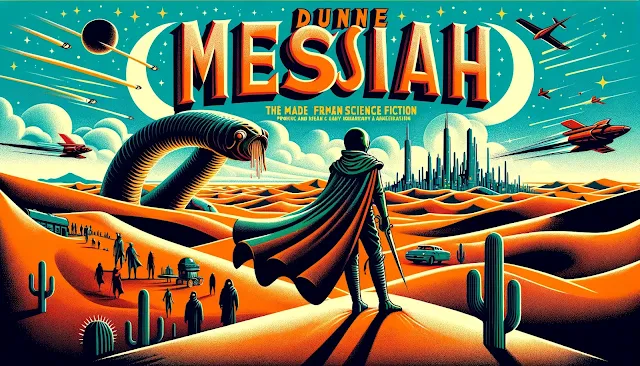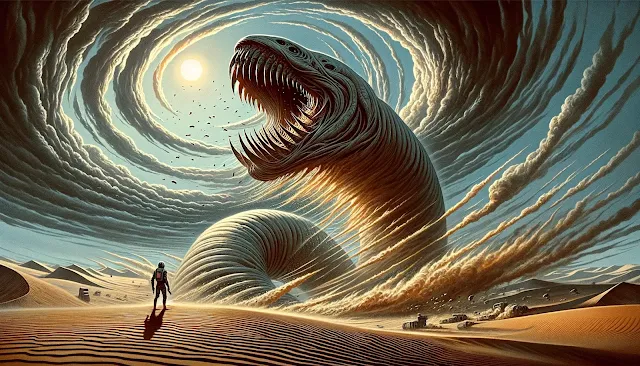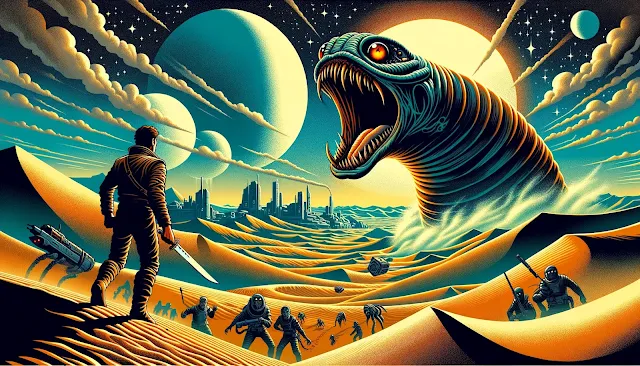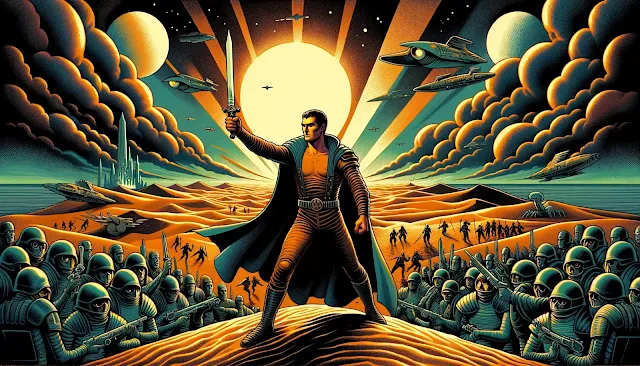Published in 1969, "Dune Messiah" intricately explores the consequences of absolute power and the paradoxes of prescience, further solidifying Herbert's universe as a masterpiece of science fiction.
The significance of "Dune Messiah" within the Dune series is profound, offering a critical bridge that challenges the triumphs of "Dune" with the weight of governance and the costs of prophecy.
Themes within "Dune Messiah" are not merely decorative; they are essential to understanding the characters' motivations, the narrative's progression, and the novel's commentary on human nature and societal structures.
Themes within "Dune Messiah" are not merely decorative; they are essential to understanding the characters' motivations, the narrative's progression, and the novel's commentary on human nature and societal structures.
Historical Context and Background of "Dune Messiah"
The socio-political and environmental concerns of the 1960s played a significant role in shaping Herbert's creation of the Dune universe. This era, marked by the Cold War, the Space Race, and growing awareness of environmental degradation, provided a fertile ground for Herbert's exploration of power dynamics, resource scarcity, and the human relationship with the environment.The Dune series, with its focus on the desert planet of Arrakis and its sole valuable resource, spice melange, reflects Herbert's critique of oil dependency and environmental exploitation.
"Dune Messiah," like its predecessor, is deeply rooted in a variety of historical events, religious philosophies, and literary works. Herbert drew upon the history of the Middle East, the tenets of Islam, and the story of the Crusades to shape the political and religious landscape of Arrakis.
"Dune Messiah," like its predecessor, is deeply rooted in a variety of historical events, religious philosophies, and literary works. Herbert drew upon the history of the Middle East, the tenets of Islam, and the story of the Crusades to shape the political and religious landscape of Arrakis.
The concept of a messianic figure leading a people to freedom, only to confront the complexities of power, is a recurring theme in religious and historical narratives, which Herbert adeptly integrates into his science fiction universe.
Furthermore, Herbert was influenced by the works of Jung, Freud, and especially the philosophies of Nietzsche, particularly the idea of the Übermensch (superman) and the eternal recurrence. These philosophical underpinnings are evident in Paul Atreides' journey from human to something beyond, challenged by the burden of his foresight and the cyclical nature of history and human behavior.
The themes present in "Dune Messiah" are a reflection of Herbert's engagement with these varied influences, weaving together a narrative that questions the morality of leadership, the inevitability of history, and the potential for individuals to transcend their inherent limitations.
Furthermore, Herbert was influenced by the works of Jung, Freud, and especially the philosophies of Nietzsche, particularly the idea of the Übermensch (superman) and the eternal recurrence. These philosophical underpinnings are evident in Paul Atreides' journey from human to something beyond, challenged by the burden of his foresight and the cyclical nature of history and human behavior.
The themes present in "Dune Messiah" are a reflection of Herbert's engagement with these varied influences, weaving together a narrative that questions the morality of leadership, the inevitability of history, and the potential for individuals to transcend their inherent limitations.
Analysis of Key Themes in "Dune Messiah"
Power and GovernanceIn "Dune Messiah," the corrupting influence of power is a central theme that impacts characters and the broader universe. Paul Atreides, who ascends to the throne as the Emperor and the revered Muad'Dib, becomes a prime example of how power can corrupt and isolate.
Despite his initial intentions to use his power for the greater good, Paul finds himself trapped in the machinations of governance and the expectations of his followers, leading to a tyranny he had hoped to avoid. The novel explores this transformation, showing how the accumulation of power can lead to unintended consequences and moral compromises.
The imperial struggle and political intrigue within the novel illustrate the complex web of alliances and betrayals that define Herbert's universe. The struggle for control over the galaxy and the spice Melange underscores the lengths to which factions will go to secure power.
The imperial struggle and political intrigue within the novel illustrate the complex web of alliances and betrayals that define Herbert's universe. The struggle for control over the galaxy and the spice Melange underscores the lengths to which factions will go to secure power.
This theme is epitomized by the political machinations of the Bene Gesserit, the Spacing Guild, and the Tleilaxu, each manipulating events to their advantage, showcasing the intricate dance of power that drives the narrative.
Prophecy and Destiny
The intertwining themes of prophecy and destiny serve as a central pillar around which much of the novel's narrative and philosophical exploration revolves. Paul Atreides' prescient abilities, a gift that enables him to glimpse into potential futures, stand at the forefront of this exploration.
The intertwining themes of prophecy and destiny serve as a central pillar around which much of the novel's narrative and philosophical exploration revolves. Paul Atreides' prescient abilities, a gift that enables him to glimpse into potential futures, stand at the forefront of this exploration.
These abilities not only propel Paul towards certain actions but also imbue his journey with a profound sense of inevitability and fate, suggesting a predetermined path that he is compelled to follow.
Yet, Herbert does not present this path as unchangeable; instead, he delves deeply into the nuances of predestination versus free will. The novel is rife with characters who, aware of their supposed destinies, engage in a constant struggle to either embrace or escape the futures laid out before them.
This battle against fate raises poignant questions about the power of prophecy and the possibility of altering one's destiny, challenging the reader to consider the extent of an individual's agency in the face of foreordained outcomes.
Herbert's treatment of these themes does more than just advance the plot; it invites a deeper philosophical inquiry into the nature of destiny, free will, and the human condition.
Through the lens of Paul's experiences and the wider repercussions of his and others' attempts to navigate their prophesied roles, "Dune Messiah" thoughtfully examines the tension between the seemingly immutable forces of destiny and the desire for autonomy and self-determination.
Identity and Transformation
Initially revered as a messianic figure by the Fremen for his role in their liberation and rise to power, Paul undergoes a profound metamorphosis into a tragic hero, ensnared by the very prescience that guides him and the sprawling consequences of his rule over the galaxy. This transformation is not merely a shift in status but a deep, introspective journey that forces Paul to confront and reassess his self-perception, beliefs, and the burdens of prophecy.
As Paul grapples with the weight of his foresight and the inexorable unfolding of events it predicts, his identity is constantly challenged and reshaped. This evolution is mirrored in the experiences of those around him, illustrating how the dynamics of power, leadership, and visionary capability can fundamentally alter one's sense of self.
Initially revered as a messianic figure by the Fremen for his role in their liberation and rise to power, Paul undergoes a profound metamorphosis into a tragic hero, ensnared by the very prescience that guides him and the sprawling consequences of his rule over the galaxy. This transformation is not merely a shift in status but a deep, introspective journey that forces Paul to confront and reassess his self-perception, beliefs, and the burdens of prophecy.
As Paul grapples with the weight of his foresight and the inexorable unfolding of events it predicts, his identity is constantly challenged and reshaped. This evolution is mirrored in the experiences of those around him, illustrating how the dynamics of power, leadership, and visionary capability can fundamentally alter one's sense of self.
The narrative meticulously examines the psychological and moral ramifications of wielding immense power, not just for Paul but for other key figures who orbit his world. These characters face their own transformations, prompted by the shifting tides of political intrigue, personal ambition, and the struggle to find agency within the constraints of a destiny seemingly preordained by Paul's visions.
Ecology and Environmentalism in Dune Messiah
Ecological themes are prominently featured in "Dune Messiah," with the terraforming of Arrakis serving as a symbol of ecological change and adaptation. Herbert uses the transformation of Arrakis from a desert wasteland to a more habitable world as a backdrop for exploring broader environmental themes, such as the impact of human intervention on ecosystems.
The novel's environmentalism is not just a narrative device but a philosophical underpinning that reflects Herbert's concerns about humanity's relationship with the natural world, drawing parallels to contemporary environmental challenges.
Religion and Mythology
Religion plays a crucial role in shaping the social and political landscape of the Dune universe. The novel delves into the influence of religious beliefs on characters' motivations and the societal structures of Arrakis, illustrating how religion can be both a source of strength and a tool for manipulation.
Herbert's use of mythological archetypes and symbols enriches the thematic depth and character development, weaving a complex tapestry of mythology that underpins the narrative.
The juxtaposition of different religious traditions and the creation of a new mythos around Paul Atreides exemplify the novel's exploration of the power of myth and belief in shaping human destiny.
Conclusion
The exploration of themes within "Dune Messiah" serves not only to deepen our understanding of the novel itself but also to enhance our appreciation of the broader Dune saga. Through a meticulous analysis of power and governance, prophecy and destiny, identity and transformation, ecology and environmentalism, and religion and mythology, we uncover the richly woven tapestry that Frank Herbert crafted.
Each theme acts as a thread, intertwining to form a complex narrative that challenges the reader to consider the implications of leadership, the burdens of foresight, the nature of self-determination, the consequences of environmental manipulation, and the power of belief systems.
Herbert's "Dune Messiah" is a testament to the enduring nature of its themes, which resonate with contemporary societal issues. The corrupting influence of power, as seen through Paul Atreides' tumultuous reign, mirrors modern discussions about authority and moral responsibility. The struggles against predestined paths reflect our own battles with determinism and the quest for personal agency.
Herbert's "Dune Messiah" is a testament to the enduring nature of its themes, which resonate with contemporary societal issues. The corrupting influence of power, as seen through Paul Atreides' tumultuous reign, mirrors modern discussions about authority and moral responsibility. The struggles against predestined paths reflect our own battles with determinism and the quest for personal agency.
The transformation of identity under the pressures of power and prophecy speaks to the fluid nature of self in the face of societal expectations and personal ambition. The ecological changes on Arrakis and the philosophical underpinnings of environmentalism echo current concerns about human impact on the Earth and the necessity for sustainable coexistence.
Check out Dune Messiah on Amazon.
















